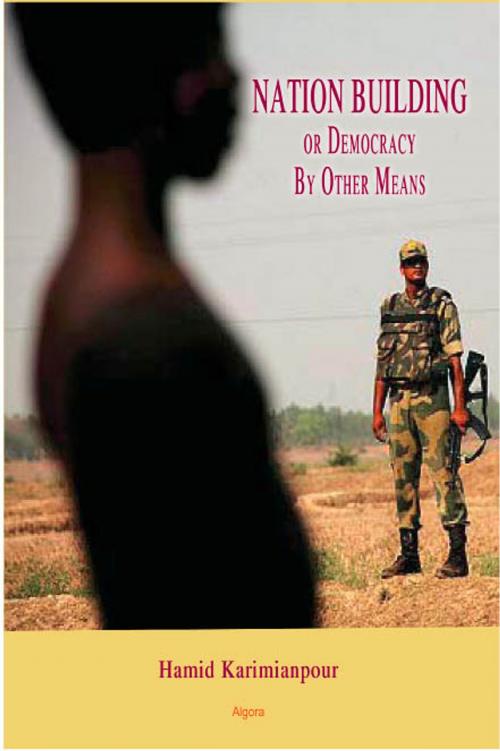Nation Building
Or Democracy by Other Means
Nonfiction, Social & Cultural Studies, Political Science, Government, Democracy| Author: | Hamid Karimianpour | ISBN: | 9780875868455 |
| Publisher: | Algora Publishing | Publication: | December 15, 2009 |
| Imprint: | Algora Publishing | Language: | English |
| Author: | Hamid Karimianpour |
| ISBN: | 9780875868455 |
| Publisher: | Algora Publishing |
| Publication: | December 15, 2009 |
| Imprint: | Algora Publishing |
| Language: | English |
Despotism, fundamentalism, and the rise of terrorism have created a puzzling moral question in the twenty-first century: how far should America go to help press ahead political and cultural change in the world?
Many Americans believe that we have a moral duty to help change the world for the better, but our well-intended efforts are often viewed by people in other parts of the world as meddling in their internal affairs. What, then, is right? Nation Building or Democracy by Other Meansexplores five major historical transformations over the past two centuries and demonstrates the significance of internal leadership for social, political, and cultural change.
The reader will discover that while international pressure has often played a pivotal role in encouraging change peaceful democratizations are historically not imposed from outside but are initiated and executed by leaders within the old system.
The book examines in a fresh light some of the watershed social changes that have shaped America as we know it, as well as failed and successful regime changes around the world.
Examples considered range from the US Abolition Movement, and the struggle for gender equality, to the fight against Apartheid, to Gorbachevs move toward democracy in the former Soviet Union, with a special focus on Iran, including the 1953 US-led coup and the 1979 hostage crisis, and an analysis of the failures and accomplishments of Ahmadinejad, who has few cards to play in the poker game of international power politics.
This book, written in easy and thought-provoking language, makes a valuable contribution to the discussion about America's obligations and limitations for changing the world.
Many Americans believe that we have a moral duty to help change the world for the better, but our well-intended efforts are often viewed by people in other parts of the world as meddling in their internal affairs. What, then, is right? Nation Building or Democracy by Other Meansexplores five major historical transformations over the past two centuries and demonstrates the significance of internal leadership for social, political, and cultural change.
The reader will discover that while international pressure has often played a pivotal role in encouraging change peaceful democratizations are historically not imposed from outside but are initiated and executed by leaders within the old system.
The book examines in a fresh light some of the watershed social changes that have shaped America as we know it, as well as failed and successful regime changes around the world.
Examples considered range from the US Abolition Movement, and the struggle for gender equality, to the fight against Apartheid, to Gorbachevs move toward democracy in the former Soviet Union, with a special focus on Iran, including the 1953 US-led coup and the 1979 hostage crisis, and an analysis of the failures and accomplishments of Ahmadinejad, who has few cards to play in the poker game of international power politics.
This book, written in easy and thought-provoking language, makes a valuable contribution to the discussion about America's obligations and limitations for changing the world.
Despotism, fundamentalism, and the rise of terrorism have created a puzzling moral question in the twenty-first century: how far should America go to help press ahead political and cultural change in the world?
Many Americans believe that we have a moral duty to help change the world for the better, but our well-intended efforts are often viewed by people in other parts of the world as meddling in their internal affairs. What, then, is right? Nation Building or Democracy by Other Meansexplores five major historical transformations over the past two centuries and demonstrates the significance of internal leadership for social, political, and cultural change.
The reader will discover that while international pressure has often played a pivotal role in encouraging change peaceful democratizations are historically not imposed from outside but are initiated and executed by leaders within the old system.
The book examines in a fresh light some of the watershed social changes that have shaped America as we know it, as well as failed and successful regime changes around the world.
Examples considered range from the US Abolition Movement, and the struggle for gender equality, to the fight against Apartheid, to Gorbachevs move toward democracy in the former Soviet Union, with a special focus on Iran, including the 1953 US-led coup and the 1979 hostage crisis, and an analysis of the failures and accomplishments of Ahmadinejad, who has few cards to play in the poker game of international power politics.
This book, written in easy and thought-provoking language, makes a valuable contribution to the discussion about America's obligations and limitations for changing the world.
Many Americans believe that we have a moral duty to help change the world for the better, but our well-intended efforts are often viewed by people in other parts of the world as meddling in their internal affairs. What, then, is right? Nation Building or Democracy by Other Meansexplores five major historical transformations over the past two centuries and demonstrates the significance of internal leadership for social, political, and cultural change.
The reader will discover that while international pressure has often played a pivotal role in encouraging change peaceful democratizations are historically not imposed from outside but are initiated and executed by leaders within the old system.
The book examines in a fresh light some of the watershed social changes that have shaped America as we know it, as well as failed and successful regime changes around the world.
Examples considered range from the US Abolition Movement, and the struggle for gender equality, to the fight against Apartheid, to Gorbachevs move toward democracy in the former Soviet Union, with a special focus on Iran, including the 1953 US-led coup and the 1979 hostage crisis, and an analysis of the failures and accomplishments of Ahmadinejad, who has few cards to play in the poker game of international power politics.
This book, written in easy and thought-provoking language, makes a valuable contribution to the discussion about America's obligations and limitations for changing the world.















